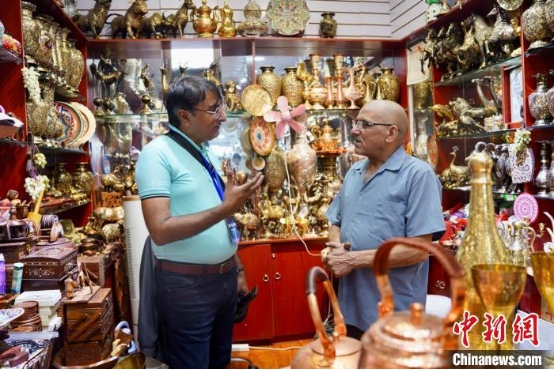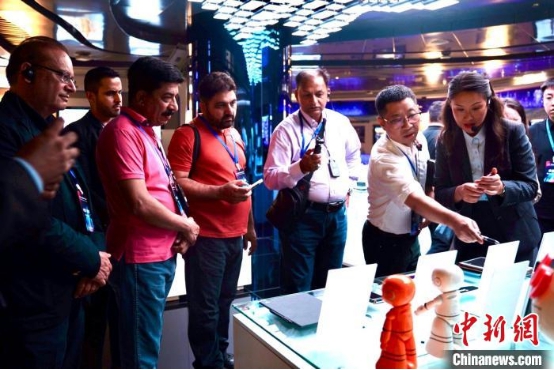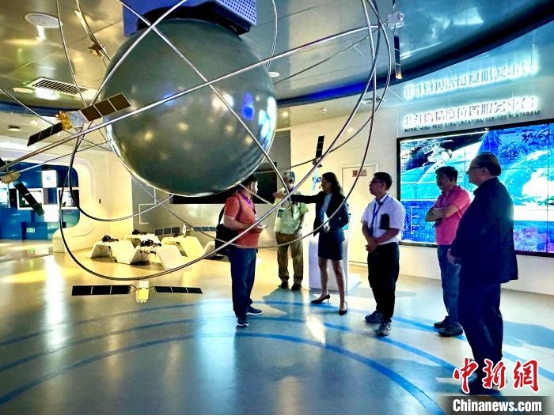by Chen Xinyi
Translated by Wang Xiaotong
“I was surprised to see handicrafts from my hometown here,” said Arbab Ali Asghar, senior reporter at PTV, as he paused at a Pakistani store. The shop, located within the International Grand Bazaar in Urumqi, the capital of the Xinjiang Uygur Autonomous Region, showcases featured handcrafted brass lamps, intricately carved copper vases, jade pendants, and other artisanal items from Pakistan.
This “reunion” with products from his motherland, spanning nearly 1,700 kilometers, made Asghar very excited. As he sees it, this small store is just like a bridge of tradition, culture and art, solidifying the friendship between Pakistan and China.

Arbab Ali Asghar, Senior Reporter, PTV, talks with Pakistani businessman Ahtar Hussain at a Pakistani store in Xinjiang International Grand Bazaar. [Photo/Chen Xinyi]
The owner of the store, Pakistani businessman Ahtar Hussain, has lived in Xinjiang for over 30 years and run business in the Grand Bazaar for nearly two decades. He is married to a local Xinjiang woman and speaks fluent Chinese. On pleasant days, he enjoys watching Dawaz (aerial tightrope walking) on the pedestrian street of the Grand Bazaar.
It’s recorded that as early as the Han Dynasty, trade and business between China and Pakistan has commenced along the ancient Silk Road. Nowadays, it is more convenient for Pakistani goods to be transported to China. Hussain and his wife have even tried live streaming sales. “Many people are interested. Our customers come from China, the United States, France, and Japan, etc.”
Now, Xinjiang International Grand Bazaar boasts over 3,000 shops, with a record high of receiving more than 200,000 visitors per day. Maarij Farooq, Deputy Editor-in-Chief of Daily Ittehad, selected a Xinjiang-style fridge magnet and picked a few handmade scarves for his families. “The quality of the goods here is better than those sold locally in Pakistan. I hope with increasingly close trade cooperation with China, Pakistan can also produce higher-quality products,” he said.

Pakistani media and think tank representatives visit the Innovation and Development Corridor in Urumqi Economic and Technological Development Zone. [Photo/Chen Xinyi]
Besides various small commodities, high-tech products also caught the representatives’ eyes.
In Xinjiang Software Park, a positioning device of BeiDou Satellite Navigation System (BDS) interested the Pakistani delegation. This new-generation intelligent product used for livestock farming, developed based on Narrowband Internet of Things, can be worn on animals to automatically collect information such as location, vital signs, and environment, which enables herders to monitor livestock remotely.
“Are all the components made in China? Can ordinary herders afford that?” asked Tahir Ali. Upon receiving affirmative answers, he gave a thumbs-up.
In Xinjiang Software Park, Pakistani delegates also tried handheld satellite messenger, iFLYTEK smart translator, and Tianyu BDS ID card, etc. “Before coming to Xinjiang, I thought such high-tech industrial parks would only exist in Shenzhen or Shanghai. I didn't expect I can find them here too,” said Maarij Farooq.

Pakistani media and think tank representatives are in front of a BeiDou Navigation Satellite System model in Xinjiang Software Park. [Photo/Chen Xinyi]
In 2013, China and Pakistan joined hands to build China-Pakistan Economic Corridor (CPEC) as a significant project under the Belt and Road Initiative (BRI). A decade later, CPEC is upgrading with a greater emphasis on industrial and technological cooperation. “From my perspective, more Pakistani companies will set up operations in Xinjiang Software Park in the future,” said Yasir Habib Khan, Founder and President, Institute of International Relations and Media Research.
“Some of our high-tech products and equipment are already sold to Central and South Asia,” said Xu Xiang, Senior Engineer, Digital Development Bureau of Urumqi Economic and Technological Development Zone. “In the future, we hope to open up a new ‘information avenue’ on the basis of traditional trade contacts, by further bringing Xinjiang's advantages in software and information services into play,” he added.
(Editor: fubo )


